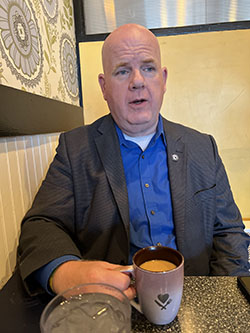By Donald H. Harrison


SAN DIEGO — Bill Ganley, 58, is the Secure Community Network (SCN) officer whose duty through the Jewish Federation of San Diego is to help members and institutions of the Jewish community protect themselves against antisemitic threats.
A Christian, Ganley had served for 22 years in the Salem, New Hampshire, Police Department, working his way up the ranks from patrolman to deputy chief in the force of 70 sworn peace officers. He did a stint in private industry, attending to the logistics of delivering lobsters to customers throughout the country, and then came to San Diego to work in the enforcement division of the San Diego Humane Society, rising to its commander within months of his arrival. Hired jointly by the Chicago-based Secure Community Network and the Jewish Federation of San Diego, he has been working since February to make the San Diego County Jewish community safer.
In an interview, Ganley drew upon two nautical analogies to deliver the message that members of Jewish institutions should continually train themselves to counter threats. “When does the Navy stop painting a ship?” he asks rhetorically. “Never,” he answered. “We have to approach training the same way. Repetition builds muscle memory.” The same might be said about reading the Torah. As soon as we finish reading the concluding fifth book, Deuteronomy, we immediately begin again reading the first book, Genesis, so that the cycle of learning never ends.
“I also use the Noah’s Ark reference,” Ganley told me. “The time to build the ark is not when it is raining. Let’s do it now.”
Doing it “now” in Ganley’s frame of reference, means Jewish institutions scheduling free training exercises that he will facilitate. One exercise teaches “situational awareness” to help people “avoid becoming involved in a critical incident.” Another exercise teaches people what to do if in fact there is a critical incident, involving, perhaps, an active shooter, or someone wielding a knife, or using a vehicle as an attack weapon. A third exercise teaches people how to prevent a victim in a critical incident from bleeding to death between the time of the attack and the time paramedics can arrive.
In addition, “We have 12 scenarios ranging from a missing child to natural disasters such as fires or floodings,” he said. “We will come into your organization, and we will set up a scenario, whichever one the organization wants.” The idea he said, is to help identify areas that need to be improved.
Ganley also is prepared to assist Jewish organizations applying for public funds to beef up their security. The federal and state governments require a “threat vulnerability assessment (TVA), which I will do for free. You need one every three years and we’ve done four assessments since I’ve been here.”
On a day-to-day basis, Ganley is in communication with law enforcement agencies throughout San Diego County and throughout the nation.
“The Secure Community Network has a Jewish Security Operations Command Center (JSOCC),” he said. “It’s the kind of place like you see in the movies, with big screens tracking things that happen all over the country. They have something they call ‘Project Rain.’ They want to be the umbrella for all the Jewish agencies in the country. They have security analysts, people dedicated to finding information that could be actionable. They are searching the open web and the dark web. They share the information with the FBI.”
If, in San Diego County, someone is the subject of an antisemitic threat or sees something suspicious that may be a threat, he or she can report it at any time on a page on the Federation’s website. The information will go immediately to the Secure Community Network, which has staff on duty 24 hours a day, seven days a week, 365 days a year. Ganley would be promptly notified about the information and take appropriate action.
“To give you a ‘for instance,’ someone called a rabbi and was insulting and threatening,” he said. “We want you to report potential issues. We don’t trivialize anything.” SCN officers like Ganley confer in a national conference call every week to chart trends and exchange information. Once a year, they hold a security summit.
During his years in Salem, New Hampshire (which is about 36 miles from the town of Salem, Massachusetts, where they had the famous colonial witch trials), Ganley only occasionally encountered cases of antisemitism.
“There are hate crimes and hate incidents,” he noted. “Some things that are egregious nevertheless don’t qualify as hate crime because it is protected (speech or press) under the First Amendment ” He said he was a midnight shift commander when a neighborhood was strewn with antisemitic flyers. “One of the officers spotted the person and stopped him, and I said, ‘hey, charge him with littering.’ What is going to happen? He”ll get a fine, but at least something was done.”
In San Diego County, Ganley has kept tabs on a youth in Chula Vista who spray painted backward swastikas and has been charged. In another case, he said, a father had picked his son up at the San Diego International Airport and was driving to their home when they got to an intersection in El Cajon and found a vandal had painted “giant swastikas and antisemitic comments.” Law enforcement officials figured out who did it “and there is a warrant for that person.”
Ganley said he asked the father how he was doing, “and he said, ‘I felt like I was hit in the stomach. We were so happy,'” celebrating all the good things that came out of the Birthright trip, ‘and then you come home and see that.'”
“I empathize,” Ganley said. “It’s terrible.”
*
Donald H. Harrison is editor emeritus of San Diego Jewish World. He may be contacted via donald.harrison@sdjewishworld.com